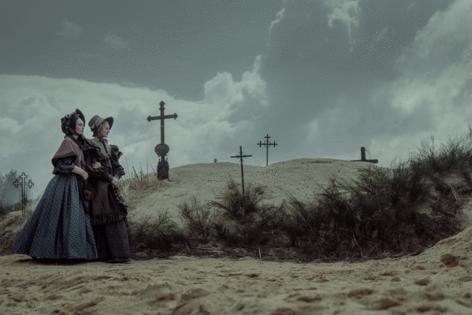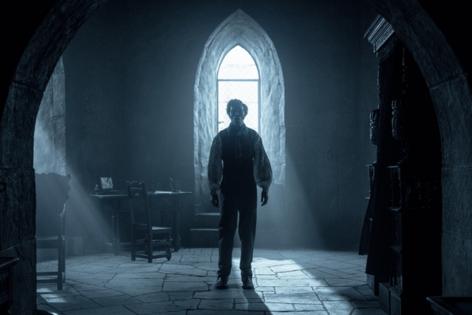Movie review: Reverence to source material drains life from 'Nosferatu'
Published in Entertainment News
Passion projects are often lauded simply for their passion, for the sheer effort that it took to bring a dream to life. Sometimes, that celebration of energy expended can obfuscate the artistic merits of a film, as the blinkered vision of a dedicated auteur can be a film’s saving grace, or its death knell. This is one of the hazards of the passion project, which is satirically explored in the 2000 film “Shadow of the Vampire,” a fictionalized depiction of the making of F.W. Murnau’s 1922 silent horror film “Nosferatu: A Symphony of Horror,” in which John Malkovich plays the filmmaker obsessed with “authentic” horror.
This meta approach is a clever twist on the iconic early horror movie that looms large in our cultural memory. Inspired by Bram Stoker’s 1897 novel “Dracula” (with names and details changed in order to skirt the lack of rights to the book), “Nosferatu” is a landmark example of German Expressionism, and Max Schreck’s performance as the vampire is one of the genre’s unforgettable villains.
“Nosferatu” has inspired many filmmakers over a century — Werner Herzog made his own bleak and lonely version with Klaus Kinski in 1979; Francis Ford Coppola went directly to the source material for his lushly Gothic “Bram Stoker’s Dracula” in 1992. Now, Robert Eggers, who gained auteur status with his colonial horror film “The Witch,” the Edgar Allen Poe-inspired two-hander “The Lighthouse,” and a Viking epic “The Northman,” delivers his ultimate passion project: a direct remake of Murnau’s film.
His first non-original screenplay, Eggers’ version isn’t a “take” on “Nosferatu,” so much as it is an overly faithful retelling, so indebted to its inspiration that it’s utterly hamstrung by its own reverence. If “Shadow of the Vampire” is a playful spin, Eggers’ “Nosferatu” is an utterly straight-faced and interminably dull retread of the 1922 film. It’s the exact same movie, just with more explicit violence and sex. And while Eggers loves to pay tribute to the style and form of cinema history in his work, the sexual politics of his “Nosferatu” feel at least 100 years old.
“Nosferatu” is a story about real estate and sexual obsession. A young newlywed, Thomas Hutter (Nicholas Hoult) is dispatched from his small German city to the Carpathian Mountains in order to execute the paperwork on the purchase of a rundown manor for a mysterious Count Orlok (an unrecognizable Bill Skarsgård), a tall, pale wraith with a rumbling voice that sounds like a beehive.
Thomas has a generally bad time with the terrifying Count Orlok, while his young bride at home, the seemingly clairvoyant Ellen (Lily-Rose Depp) is taken with terrifying nightmares and bouts of sleepwalking, consumed by psychic messages from the Count, who has become obsessed with her. He makes his way to his new home in a rat-infested ship, unleashing a plague; Ellen weighs whether she should sacrifice herself to the Count in order to save the town, which consists of essentially three men: her husband, a doctor (Ralph Ineson) and an occultist scientist (Willem Dafoe).
There’s a moment in the first hour of “Nosferatu” where it seems like Eggers’ film is going to be something new, imbued with anthropological folklore, rather than the expressionist interpretation of Murnau. Thomas arrives in a Romanian village, where he encounters a group of jolly Romani who laugh at him, warn him, and whose blood rituals he encounters in the night. It’s fascinating, fresh, culturally specific, and a new entry point to this familiar tale. Orlok’s mustachioed visage could be seen as a nod to the real Vlad the Impaler, who likely inspired Stoker.
But Eggers abandons this tack and steers back toward leaden homage. The film is a feat of maximalist and moody production design and cinematography, but the tedious and overwrought script renders every character two-dimensional, despite the effortful acting, teary pronunciations and emphatically delivered declarations.
Depp whimpers and writhes with aplomb, but her enthusiastically physical performance never reaches her eyes — unless they’re rolling into the back of her head. Regardless of their energetic ministrations, she and Hoult are unconvincing. Dafoe, as well as Aaron Taylor-Johnson and Emma Corrin, as family friends who take in Ellen, bring a winking campiness, breathing life into the proceedings, while Simon McBurney devilishly goes for broke as the Count’s familiar. However, every actor seems to be in a different movie.
Despite the sex, nudity and declarations of desire, there’s no eroticism or sensuality; despite the blood and guts, there’s nothing scary about it either. This film is a whole lot of style in search of a better story, and without any metaphor or subtext, it’s a bore. Despite his passion for the project, or perhaps because of it, Eggers’ overwrought “Nosferatu” is dead on arrival, drained of all life and choked to death on its own worship.
———
‘NOSFERATU’
2 stars (out of 4)
MPA rating: R (for bloody violent content, graphic nudity and some sexual content)
Running time: 2:15
How to watch: In theaters Dec. 25
———
©2024 Tribune Content Agency, LLC
















Comments